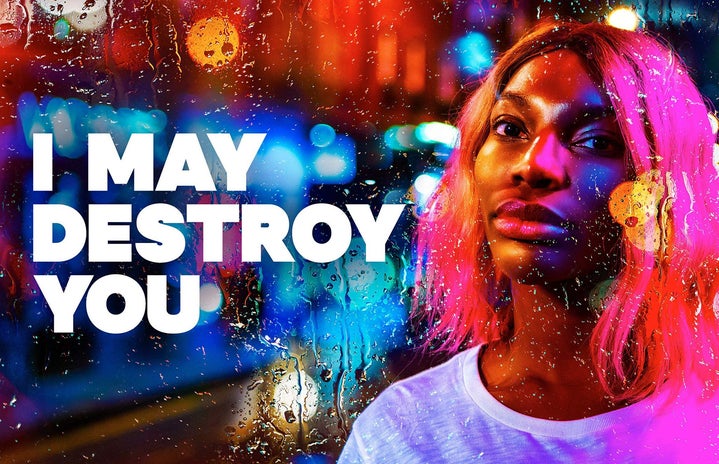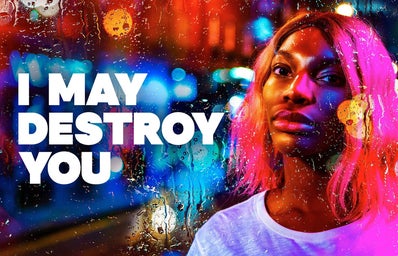TW: Sexual assault
If you haven’t seen ‘I May Destroy You’ yet, I am begging you; put down whatever you’re doing–yes, even this article–and watch it. A truly phenomenal series tackling important but delicate issues, ‘I May Destroy You’ premiered in the UK and US in June 2020 to immediate and widespread acclaim. Michaela Coel, a black British actress, screenwriter, director, producer, singer and all-round powerhouse who you may know from the likes of E4’s ‘Chewing Gum’ not only wrote and codirected the series, but also starred as the main character, Arabella. IMDY follows Arabella as she attempts to rebuild her life after being drugged and raped on a night out. Throughout the 12 episodes, a number of characters navigate difficult and traumatizing experiences of sexual assault; from Arabella’s rape and later assault through ‘stealthing’ (non-consensual condom removal), to her friend Kwame’s violent encounter with a Grindr match. IMDY faces these issues head-on, going so far as to confront the way in which victims are repeatedly ignored and let down by the police. Ultimately, IMDY is a story about the aftermath of rape: what’s so powerful about it is that it also provides a terrifyingly accurate reflection of the world we live in today. You’d be forgiven for thinking that a television series that so boldly portrays such raw, vulnerable, uncomfortable human experiences would be bound to win at least one award, right? Well, not quite.
The Golden Globe Awards–accolades awarded by the Hollywood Foreign Press Association (HFPA)–began in January 1944, seeking to recognize film and television excellence. This year’s Golden Globe nominations saw shows such as ‘The Crown’, ‘Ozark’, and ‘Emily in Paris’ receive nominations for ‘Best Television Series’ and ‘Best Performer in a Television Series’; Coel’s ‘I May Destroy You’, however, received not one single nomination.
Deborah Copaken, a writer for nominated Netflix series ‘Emily in Paris’ slammed the Golden Globes for ‘snubbing’ BBC series ‘I May Destroy You’; she praised the show in a recent opinion piece for The Guardian, deeming it her “favourite show ever” and explaining how she was left stunned by the lack of recognition it received from the Globes and the HFPA. Copaken went on to discuss the snub as part of an industry-wide racism issue, suggesting that Coel’s work was overlooked as a result of her race. She described a number of worrying statistics to support her argument, for example Color of Change’s 2017 report that found a staggering 91% of all Hollywood showrunners – those with the most creative power and authority when making these shows – are white. To make matters worse, 80% are also male; disappointing but not altogether surprising statistics. The Golden Globes are typically seen as the epitome of all things ‘Hollywood’; fashion, glamour, celebs; but most importantly, these award shows are meant to be a celebration of talent. Statistics like these beg the question; why is only white excellence awarded? Are these award shows, and Hollywood by extension, a fundamentally flawed and racist system?
In January 2015, social media activist for diversity April Reign coined the hashtag #OscarsSoWhite. The movement was in response to the recently announced Academy Award nominations for that year; of the 20 acting nominees, not a single one was a person of colour. Since then, the hashtag has been used to spread awareness about the lack of diversity in Hollywood. The movement sparked significant changes within the Oscars’ voting panel, too; as of June 2020, the Academy’s members consist of 45% women, 36% underrepresented ethnic and racial communities, and 49% international members from a total of 68 countries – not just the US.
Regardless of these changes and the efforts to expose Hollywood racism, it seems very little has changed; the same year the panel diversified, only one person of colour, Cynthia Erivo, was nominated for an Academy Award.
So, what can we do to make sure every film and television series gets the recognition it deserves? Well, Spiderman: Into the Spider-Verse’ director, Peter Ramsey, suggests we stop using award ceremonies as the only measure of success in the industry – and I have to say I’m with him on this one. If the likes of the Oscars and Golden Globes are not willing to fairly recognise the talent of all people, regardless of race, religion, (dis)ability, etc., they should surely be left in the past; it’s time to let go of outdated systems that are unwilling to provide and encourage real cultural representation. Instead, we must elevate and celebrate the voices of those who have stories to tell – stories of any kind. After all, the film and television you watch should not be limited to what resonates with your personal identity and experiences. So, once again, if you haven’t already, I am urging you to watch ‘I May Destroy You’ (and as many other diverse stories by amazing, unique creators as you can get your hands on) – listen closely to what it can teach you about an experience that isn’t your own.
Words By: Rosie Harkin-Adams
Edited By: Amelia Reed



